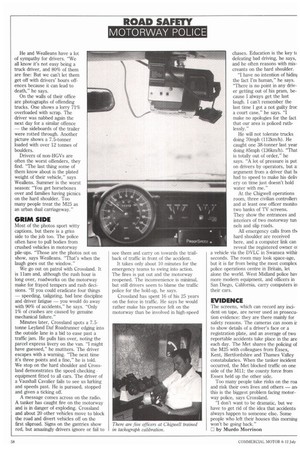ROAD SAFETY MOTORWAY POLICE
Page 60

If you've noticed an error in this article please click here to report it so we can fix it.
He and Wealleans have a lot of sympathy for drivers. "We all know it's not easy being a truck driver, and 80% of them are fine: But we can't let them get off with drivers' hours offences because it can lead to death," he says.
On the walls of their office are photographs of offending trucks. One shows a lorry 71% overloaded with scrap. The driver was nabbed again the next day for a similar offence — the sideboards of the trailer were rotted through. Another picture shows a 7.5-tonner loaded with over 12 tonnes of boulders.
Drivers of non-HGVs are often the worst offenders, they find. "The last thing some of them know about is the plated weight of their vehicle," says Weallens. Summer is the worst season: "You get horseboxes over and families having picnics on the hard shoulder. Too many people treat the M25 as an urban dual carriageway."
GRIM SIDE
Most of the photos sport witty captions, but there is a grim side to the job too. The police often have to pull bodies from crushed vehicles in motorway pile-ups. "Those are the photos not on show, says Wealleans. "That's when the laugh goes out the window."
We go out on patrol with Crossland. It is llam and, although the rush hour is long over, roadworks on the motorway make for frayed tempers and rash decisions. "If you could eradicate four things — speeding, tailgating, bad Lane discipline and driver fatigue — you would do away with 90% of accidents," he says. "Only 1% of crashes are caused by genuine mechanical failure."
Minutes Later, Crossland spots a 7.5tonne Leyland Daf Roadrunner edging into the outside lane in a bid to ease past a traffic jam. He pulls him over, noting the parcel express livery on the van. "I might have guessed," he muttters. 'rhe driver escapes with a warning. "The next time it's three points and a fine," he is told. We stop on the hard shoulder and Crossland demonstrates the speed checking. equipment fitted to all cars. The driver of a Vauxhall Cavalier fails to see us lurking and speeds past. He is pursued, stopped and given a ticking off.
A message comes across on the radio. A tanker has caught fire on the motorway and is in danger of exploding. Crossland and about 20 other vehicles move to block the road and divert vehicles off on the first sliproad. Signs on the gantries show red, but amazingly drivers ignore or fail to see them and carry on towards the trailback of traffic in front of the accident.
It takes only about 10 minutes for the emergency teams to swing into action. The fires is put out and the motorway reopened. The inconvenience is minimal, but still drivers seem to blame the traffic police for the hold-up, he says.
Crossland has spent 16 of his 25 years on the force in traffic. He says he would rather make his presence felt on the motorway than be involved in high-speed chases. Education is the key tc defeating bad driving, he says, and he often reasons with miscreants on the hard shoulder.
"1 have no intention of hidinj the fact I'm human," he says. "There is no point in any driver getting out of his pram, because I always get the last laugh. I can't remember the last time I got a not guilty fror a court case," he says. "I make no apologies for the fact that our area is policed ruthlessly."
He will not tolerate trucks doing 70mph (112km/h). He caught one 38-tonner last year doing 85mpli (136km/h). "That is totally out of order," he says. "A lot of pressure is put on drivers by operators, but a argument from a driver that hi had to speed to make his deliv cry on time just doesn't hold water with me."
At the Chigwell operations room, three civilian controllers and at least one officer monito two banks of TV screens. They show the entrances and interiors of two motorway tun. nels and slip roads.
All emergency calls from thi hard shoulder are received here, and a computer link can reveal the registered owner 01 a vehicle via the DVLC in Swansea withii seconds. The room may look space-age, but it is far from being the most complex police operations centre in Britain, let alone the world. West Midland police hay more modern equipment, and officers in San Diego, California, carry computers in their cars.
EVIDENCE
'I'he screens, which can record any incident on tape, are never used as prosecution evidence: they are there mainly for safety reasons. The cameras can zoom ir to show details of a driver's face or a registration plate, and an average of two reportable accidents take place in the are each day. The Met shares the policing of the M25 with colleagues from Essex, Kent, Hertfordshire and Thames Valley constabularies. When the tanker incident occurred, the Met blocked traffic on one side of the M11; the county force from Essex held up the other side.
Too many people take risks on the roa and risk their own lives and others — an' this is the biggest problem facing motorway police, says Crossland.
"I don't want to be dramatic, but we have to get rid of the idea that accidents always happen to someone else. Some people who left their houses this morning won't be going back."
by Murdo Morrison




















































































































